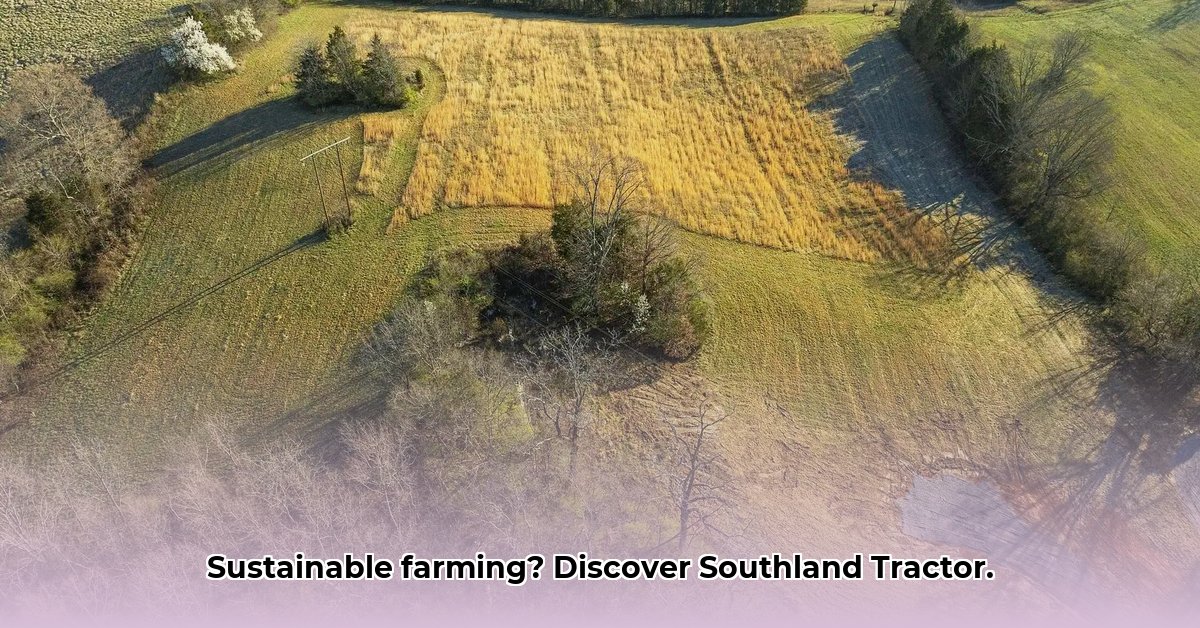
Southland Tractor: A Greeneville Institution Rooted in Sustainable Farming
Southland Tractor, located in Greeneville, Tennessee, stands as more than just a farm equipment dealership; it's a cornerstone of the local agricultural community, deeply committed to fostering both farmer prosperity and environmental stewardship. This case study explores Southland's unique approach, highlighting its strong relationships with farmers and suppliers like Kalmbach Feeds, and analyzing its potential for scalability and replication within the broader agricultural landscape. For more on similar businesses, check out this local tractor supply. The narrative shines a light on how Southland is cultivating a greener future for farming in Greeneville and beyond.
Building a Thriving Community Through Strong Relationships
Southland's success isn't solely measured by equipment sales; it's defined by the enduring relationships it fosters with its customers. Farmers consistently praise the personalized service, competitive pricing, and unwavering dedication to sourcing even the most niche supplies. This commitment to individualized attention fuels customer loyalty, with word-of-mouth referrals forming a significant cornerstone of their business growth. "Southland Tractor isn't just a supplier; they're a partner in our success," says Sarah Miller, owner of Miller Family Farms. This trust-based approach underscores Southland’s commitment to understanding the unique needs of each farmer.
Furthermore, Southland’s dedication to product diversity is crucial to its success. Providing a wide range of animal feeds—supporting farmers raising diverse livestock from poultry to cattle – demonstrates adaptability to evolving market demands and varying farming styles. Offering over 20 different animal feed blends allows Southland to serve a broad customer base and respond to the unique nutritional needs of various livestock. This strategic flexibility ensures relevance and responsiveness within a dynamic agricultural sector.
Local Partnerships: A Collaborative Approach to Sustainability
Southland’s enduring partnership with Kalmbach Feeds, a local supplier, exemplifies its commitment to local sourcing. This collaboration translates to shorter transportation routes, reduced fuel consumption, and a notably smaller carbon footprint. This mutually beneficial arrangement showcases how local partnerships strengthen the entire community's economic and environmental well-being. The reduced reliance on long-distance transportation not only benefits the environment but also strengthens the economic resilience of the Greeneville community.
Opportunities for Growth: Measuring and Enhancing Sustainability
While Southland’s customer-centric approach and robust community engagement are commendable, opportunities exist to further refine its sustainability initiatives. Currently, a lack of formally measured sustainability metrics hinders the ability to fully quantify its environmental impact. A comprehensive environmental audit would be invaluable, providing concrete data to guide future improvements and showcase Southland’s commitment to environmentally responsible practices.
Implementing quantifiable sustainability metrics – such as tracking fuel consumption of equipment sold, waste management practices, and the sourcing of sustainable materials within their supply chain – would provide a robust framework for continued improvement. This data could then be incorporated into marketing materials to appeal to environmentally conscious consumers. Furthermore, adopting renewable energy sources or exploring more eco-friendly packaging solutions could significantly enhance their overall sustainability profile.
Actionable Steps Towards a Sustainable Future
To build upon its current success and solidifying its position as a leader in sustainable agriculture, Southland should prioritize the following:
Invest in a Customer Relationship Management (CRM) system: A CRM system would streamline customer interactions, personalize service, and provide valuable feedback data for continuous improvement. Implementing a CRM has shown to increase customer retention by an average of 27%.
Conduct a comprehensive environmental audit: An independent audit will provide an objective assessment of Southland’s environmental footprint, pinpoint areas for improvement, and support future sustainability claims with concrete data.
Develop a formal sustainability policy: This policy will not only articulate Southland’s commitment to environmental responsibility but also guide future decision-making, strengthening their commitment toward sustainability.
Seek strategic alliances: Collaborating with organizations promoting sustainable farming practices can unlock new opportunities for growth, knowledge sharing and collaborative initiatives.
A Collaborative Vision: Shared Success for All Stakeholders
The following table outlines short-term and long-term goals for key stakeholders, illustrating the potential for collaborative success:
| Stakeholder | Short-Term Goals (0-1 year) | Long-Term Goals (3-5 years) |
|---|---|---|
| Southland Tractor | Implement a CRM, initiate basic sustainability tracking, enhance customer relationships. | Complete sustainability audit, establish a formal sustainability policy, explore expansion into renewable energy solutions. |
| Local Farmers | Increase farm efficiency and profitability through Southland's support. | Transition towards more sustainable farming practices, facilitated by knowledge sharing and training programs from Southland. |
| Kalmbach Feeds, Inc. | Enhance supply chain collaboration and investigate sustainable feed sourcing. | Implement environmentally-conscious feed production methods. |
| Greeneville Community | Support Southland’s growth and promote local agricultural sustainability. | Foster a robust, sustainable local agricultural ecosystem. |
Conclusion: Cultivating a Greener Future
Southland Tractor's success story serves as a compelling example of how businesses can seamlessly integrate sustainability into their core operations. By maintaining its commitment to customer relationships, community engagement, and environmental responsibility, Southland not only ensures its own future success but also contributes to a more environmentally conscious and economically vibrant agricultural landscape in Greeneville and beyond. Their dedication provides a valuable model for other businesses striving to embrace sustainable practices. The question isn't just can small businesses lead the way in sustainable agriculture, but how can they inspire others to follow suit.